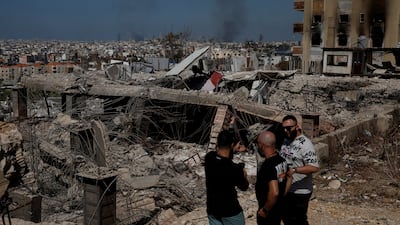Live updates: Follow the latest on Israel-Gaza
Leading humanitarian organisations on Thursday called for a ceasefire in Lebanon, expressing deep concern over the escalating effects of the Israel-Hezbollah conflict on civilians.
“The last couple of weeks have been a complete nightmare,” said Jennifer Moorehead, Lebanon country director for Save the Children.
She described the situation in Beirut as a “crisis of alarming proportions”, with more than 1.2 million people displaced, representing 20 per cent of the population.
Among them, 420,000 are children, particularly in Beirut, she told reporters.
Families are sleeping in cars or outdoors, surrounded by their belongings, as hospitals in attacked regions are overwhelmed with casualties, said Ms Moorehead.
“Those of us living in Beirut are also not sleeping because of the ferocity and the strength of the targeting of Beirut, not just in Dahieh but in other locations,” she added.
She said that about 310,000 people have crossed into Syria, with many accounts of unaccompanied and abandoned children at the border.
Israel this week announced its troops have launched invasions into southern Lebanon, after days of intense air strikes on Hezbollah positions across the country.
After nearly a year of low-intensity, cross-border clashes, Israel has escalated its military actions for an invasion of Lebanon while still operating in Gaza. Heavy bombings have claimed more than 1,000 lives, Lebanon's Health Ministry said.
Last week, Israel killed Hezbollah leader Hassan Nasrallah in southern Beirut, a once densely populated area now largely empty due to intensified Israeli strikes.
Ahmad Chreif, deputy medical co-ordinator at Medecins du Monde in Beirut, reported that 867 centres have been opened for displaced people, including schools and universities, but 643 of them have already reached full capacity.
Several global non-profit organisations have called for an immediate ceasefire to prevent further escalation.
Sally Abi Khalil, Oxfam's regional director for the Middle East and North Africa, warned of a growing multi-country humanitarian crisis, pointing to Israel's actions as the common factor.
“Israel has been allowed to act with impunity and complete disregard for international law and the protection of civilians, first in Gaza, then here in Lebanon,” Ms Abi Khalil told reporters. “We are now witnessing an escalation across the region.”
Echoing her concerns, Jeremy Konyndyk, president of Refugees International, emphasised the broader impact of Israel’s military actions on refugees.
“We know from the way that the [Israeli military] has fought in Gaza that their targeting of Hezbollah will not only harm Hezbollah, it will harm Lebanese civilians. It will harm Syrian refugees. It will harm the 200,000 Palestinian refugees who remain in Lebanon,” he said.
“This is a country that for years, has been one of the most generous refugee-hosting countries on earth per capita, those people are all at risk as well.”
Mr Konyndyk further criticised US President Joe Biden and his administration’s stance on the conflict: “The US government has not explained in any clear way why it went from spending all of last week talking to and working with other national leaders on the margins of the UN General Assembly meetings in New York to push for de-escalation, a ceasefire, and to go from that to an abrupt and immediate shift to expressing public support for the Israeli invasion.
“Those two positions cannot be easily reconciled."


